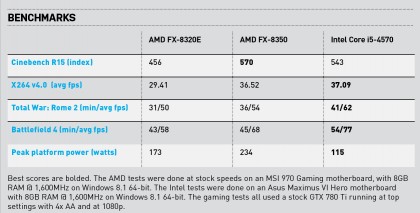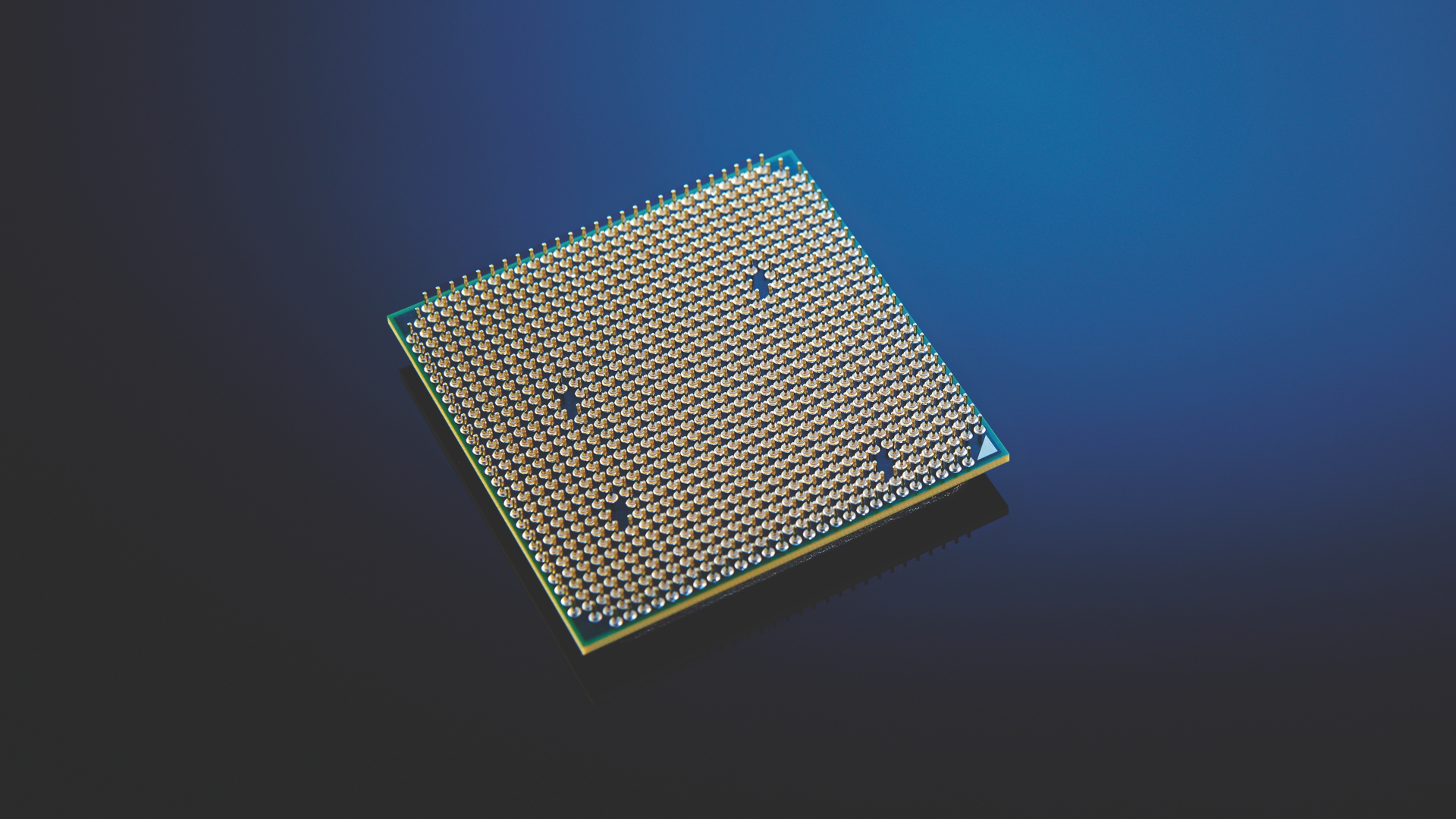TechRadar Verdict
The cheapest eight-threaded CPU around, but there are better options if you don't need that sort of multi-threaded capability.
Pros
- +
A decent upgrade for an existing AMD setup
- +
relatively cheap
Cons
- -
Old, old tech
- -
still more power-hungry than Intel
- -
no native USB 3.0 or PCIe support
Why you can trust TechRadar
When AMD tells us it's sending over a new FX-series CPU, we can't help the sudden rush of excitement. It's an automatic response, born of a time when a new AMD CPU had the potential to offer something genuinely competitive.
But those days seem long gone. All we get now are half-hearted revisions of increasingly elderly chips.
The FX-8320E is the perfect example of that. AMD released this chip late last year, along with the FX-8370E as a pair of lower-powered octo-core CPUs for the more power-conscious consumer.
These two chips use AMD's Bulldozer processor tech and squeeze into a 95W TDP. They're able to do this by utilising a lower base clock, but retaining the same Turbo clock as their non-E brethren.
To that end, this FX-8320E is running at 3.2GHz as standard, with the ability to hit 4GHz as needed. The standard FX-8320's clockspeed sits some 300MHz higher at 3.5GHz.
So far, so good. For 30W less power you only sacrifice 300MHz of CPU horsepower, which seems like a pretty good trade-off.
But the fact these CPUs are still running with an outdated version of the Bulldozer architecture makes them seem more like an afterthought than a proper processor release. In the Kaveri APU, launched a year ago, AMD used the latest revision of Bulldozer, codenamed Steamroller. Its next APU, Carrizo, will use the final Bulldozer revision which is codenamed Excavator.
Sign up for breaking news, reviews, opinion, top tech deals, and more.
This 95W processor then, using the old Piledriver architecture, is two generations behind AMD's top x86 CPU cores.
And it doesn't look like it has any interest at all in shifting the FX range over to the Excavator design, despite the IPC (instructions per clock) boosts that both the Steamroller and Excavator tech have over Piledriver.
The cost of saving
What's the game with the FX-8320E then?
You'd assume that with the focus on hitting a lower TDP, this chip would be looking at small form factor machines, but that 95W TDP is still higher than the 84W Haswell Core i5 processors, even the K-series versions.
But then there's the price. At just over £100, this is the cheapest eight-core CPU around – even if you baulk at referring to its quad-module design as a full octo-core setup it still sits as the cheapest, eight-threaded processor you can buy.
In this context, suddenly the FX-8320E looks like a more intriguing purchase.
That's especially true if you're sitting on a lower core-count AM3+ chip and feel the need for an upgrade. In performance terms – in both straight CPU and gaming tests – the FX-8320E is evidently behind both the FX-8350 and Intel Core i5-4570, but it's a good £30-50 cheaper than those more powerful chips.
And because it's an AMD chip, without the needless limitations imposed on it by overzealous marketing execs (looking at you, Mr Intel K-series), you can get happy with the overclocking. Well, should your chosen chip and board be capable of it anyways.
Our sample wasn't very happy running anything above 4GHz. We got a little more out of it with some voltage tweaks, but not enough to keep it stable on the MSI 970 Gaming motherboard we were testing it in.
Still, at that speed on all cores it runs mighty close to a stock-clocked, full-fat AMD FX-8350.
For the AMD upgrader then, it's not a bad budget option. If you're looking to build an all-new machine though we'd still struggle to recommend an AMD setup.
Even though you're getting eight threads of processing power, a resolutely quad-core, un-overclockable Core i5-4570 will still deliver better CPU performance, and in a smaller power envelope too.
The Intel platform is also going to be more up to date and not much more expensive either. While AMD's AM3+ chipsets were queuing up for their pensions, Intel's motherboard chipsets were busy fitting themselves out with native USB 3.0 and PCIe 3.0 support…
And then there's gaming.
If you're a PC gamer, your AMD CPU is stealing frames from your graphics card. The difference between the Intel Core i5-4570 and this FX chip is nearly 20fps on average at 1080p settings with the same GPU. And that's with a 50W peak platform power saving over the AMD offering too.
Yes, it's initially a cheaper option, but you're paying a different price going the AMD route.

We liked
It's all about the pricing of this AMD CPU. At under £100 it's the cheapest eight-threaded CPU you can buy. If you're into your multi-threaded productivity applications then the concurrent performance of the FX chip's quad-module design will deliver a lot of processing power for the money.
And you can overclock too. Running at 4GHz you're getting almost the same level of performance as the pricier FX-8350.
We disliked
AMD's processor platform is looking seriously geriatric these days. Without native support for either USB 3.0 or PCIe 3.0 it has to rely on the board manufacturers to bring in third-party silicon to deal with such things. And that introduces more performance barriers.
Gaming is also a problem for the FX-8320e - you could potentially lose out on a lot of the performance potential of your graphics card opting for an eight-thread FX chip over a quad-core Intel.
Verdict
As a budget eight-threaded option the FX-8320e is a decent choice of chip for the productivity folk, but if you're looking to build a budget gaming rig you will be losing out on some of the performance potential of your GPU.
------------------------------
